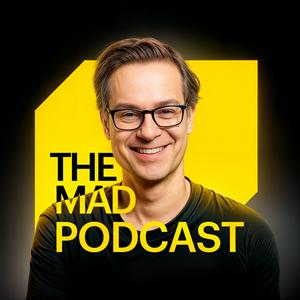How to Build a Beloved AI Product - Granola CEO Chris Pedregal
Granola is the rare AI startup that slipped into one of tech’s most crowded niches — meeting notes — and still managed to become the product founders and VCs rave about. In this episode, MAD Podcast host Matt Turck sits down with Granola co-founder & CEO Chris Pedregal to unpack how a two-person team in London turned a simple “second brain” idea into Silicon Valley’s favorite AI tool. Chris recounts a year in stealth onboarding users one by one, the 50 % feature-cut that unlocked simplicity, and why they refused to deploy a meeting bot or store audio even when investors said they were crazy.We go deep on the craft of building a beloved AI product: choosing meetings (not email) as the data wedge, designing calendar-triggered habit loops, and obsessing over privacy so users trust the tool enough to outsource memory. Chris opens the hood on Granola’s tech stack — real-time ASR from Deepgram & Assembly, echo cancellation on-device, and dynamic routing across OpenAI, Anthropic and Google models — and explains why transcription, not LLM tokens, is the biggest cost driver today. He also reveals how internal eval tooling lets the team swap models overnight without breaking the “Granola voice.”Looking ahead, Chris shares a roadmap that moves beyond notes toward a true “tool for thought”: cross-meeting insights in seconds, dynamic documents that update themselves, and eventually an AI coach that flags blind spots in your work. Whether you’re an engineer, designer, or founder figuring out your own AI strategy, this conversation is a masterclass in nailing product-market fit, trimming complexity, and future-proofing for the rapid advances still to come. Hit play, like, and subscribe if you’re ready to learn how to build AI products people can’t live without.GranolaWebsite - https://www.granola.aiX/Twitter - https://x.com/meetgranolaChris PedregalLinkedIn - https://www.linkedin.com/in/pedregalX/Twitter - https://x.com/cjpedregalFIRSTMARKWebsite - https://firstmark.comX/Twitter - https://twitter.com/FirstMarkCapMatt Turck (Managing Director)LinkedIn - https://www.linkedin.com/in/turck/X/Twitter - https://twitter.com/mattturck(00:00) Introduction: The Granola Story (01:41) Building a "Life-Changing" Product (04:31) The "Second Brain" Vision (06:28) Augmentation Philosophy (Engelbart), Tools That Shape Us (09:02) Late to a Crowded Market: Why it Worked (13:43) Two Product Founders, Zero ML PhDs (16:01) London vs. SF: Building Outside the Valley (19:51) One Year in Stealth: Learning Before Launch (22:40) "Building For Us" & Finding First Users (25:41) Key Design Choices: No Meeting Bot, No Stored Audio (29:24) Simplicity is Hard: Cutting 50% of Features (32:54) Intuition vs. Data in Making Product Decisions (36:25) Continuous User Conversations: 4–6 Calls/Week (38:06) Prioritizing the Future: Build for Tomorrow's Workflows (40:17) Tech Stack Tour: Model Routing & Evals (42:29) Context Windows, Costs & Inference Economics (45:03) Audio Stack: Transcription, Noise Cancellation & Diarization Limits (48:27) Guardrails & Citations: Building Trust in AI (50:00) Growth Loops Without Virality Hacks (54:54) Enterprise Compliance, Data Footprint & Liability Risk (57:07) Retention & Habit Formation: The "500 Millisecond Window" (58:43) Competing with OpenAI and Legacy Suites (01:01:27) The Future: Deep Research Across Meetings & Roadmap (01:04:41) Granola as Career Coach?


